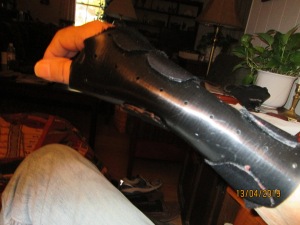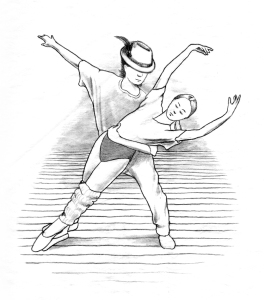Prologue
It is 1898. Joe Stanton’s Irish immigrant father, grimy and exhausted after a long day’s labor and beaten down under the weight of company store debt, has little hope to pass on to his youngest son. And yet there are the evening fiddle tunes, the dark Irish stories told around the small stove in the miner’s shanty and the wit that never buckles in the face of grinding poverty. Joe has some token schooling, but at 12, he takes his place alongside his father in the mines. He would seem to be yet another “strong back and weak mind” — slaving life away building the wealth of others. But he has a different plan. He does not want the new century to see him coughing up the black flecks that mark his father’s hacking spells.
At nineteen, Joe manages to exchange the coal company scrip from his last month’s work for American cash and heads south across the Piedmont to escape the meager prospects in the West Virginia coal fields. Surely he can put his strong back to work to support himself, and send some “real” money home to help his struggling family.
Granite is being quarried near the small North Carolina town of Mount Barclay. Barclay Mining is run by Millard Wheatley — the latest of several owners. None before him have been able to turn a profit, but, with Wheatley’s influence, a rail spur is being extended to the quarry proper which should finally make the enterprise profitable.
Wheatley is rich, arrogant — and unscrupulous. He controls what he doesn’t own outright in the little town — from cradle to grave. A general store with children’s shoes and candy barrels — and a funeral parlor — sit at opposite ends of Barclay’s single, dusty business district. In between, scattered offices house his land, real estate and lumber interests. The head of the last elk shot in the region is mounted prominently in his hardware store. This building is two stories with a full basement under it – one of the most impressive structures in the small town, and the headquarters of his Mountain Empire.
Wheatley’s quarry boss takes on Joe and is soon pleased with his strength and tireless labor — and his wit and humor. Joe is quick with a joke and a laugh and not given to the complaints and grumblings that mark most of the other laborers. Days spent in the free air of the open quarry are reason enough to lift Joe’s spirit, after the grimy pits of West Virginia. He describes his family’s misery and his gratitude toward his present circumstances to his Tarheel coworkers.
He is soon the most reliable “dynamiter” in the operation — analyzing the granite seams, drilling the holes, placing the charges and finally, lighting the fuses. All this done, he sprints to a safe spot for viewing, and watches with pride as the resultant blast frees exactly the portion of the granite wall he aimed for.
Wheatley doesn’t spend much time at the quarry, but hears enough about Joe to realize that the young Irishman could be useful to him. Young, naive and trusting, Joe is increasingly asked to run personal errands for Wheatley who teaches Joe some rudimentary money handling and soon has him clerking at his hardware store. He begins to mold him into a tool for a scheme that the great man is hatching.
Some of the tycoon’s dealings have caught up with him and he realizes that unless he turns a large profit on one of his enterprises soon, his entire house of cards is apt to tumble. He comes to the conclusion that the hardware store might be his salvation.
The store sits smack in the middle of Mount Barclay’s main thoroughfare, on the east side of the north-south running street. The bottom floor is filled with the paraphernalia of the day: nails, nuts, bolts, horse tack, plow points, metal cookware, axes, knives, shovels, picks, tubs, kegs, — and a thousand other items useful in a nineteenth century town. Wheatley’s hunting trophies occupy any wall space that doesn’t have a bridle or harness hanging on it. A pot-bellied stove sits in the middle surrounded by three or four cane-bottomed chairs. The second floor has a large meeting room and several smaller rooms of stored merchandise and files containing the store’s records. The stoned up cellar houses jugs of turpentine, kerosene and a few bottles of locally made spirits that Wheatley consults on occasion.
But it all has to go. Wheatley has insured the store and its contents to double its real value with the connivance of a bribed insurance auditor. He begins to set in motion a scheme to collect this windfall. The store must be destroyed, but it must be done in a way that throws no suspicion on him — and ideally – directs the blame toward someone else. He has no lack of enemies. He just needs a willing collaborator.
Wheatley cultivates Joe’s trust with patience and cunning. Joe thankfully accepts the credit that Wheatley extends to him. He can, after all, send more of his own cash back to his impoverished West Virginia family. He discovers – with Wheatley’s encouragement — the charms of the whisky collection in the cellar. Wheatley also feeds the gullible young man tales of greed, fraud, bribery and other malfeasances that Wheatley himself is exquisitely familiar with. Wheatley paints a picture of himself as a struggling businessman beset on all sides by others wanting to do him in. Joe remembers his own family’s servitude under unscrupulous mine owners, and he is inclined to believe his employer.
The tycoon concocts a tall tale. He gradually convinces the uneducated Joe that a rapacious insurance company has worked a devious scheme to seize most of his property. Joe is astounded, however, at Wheatley’s carefully described plan to burn down his own hardware store to forestall this takeover. As Wheatley hopes, Joe doesn’t fully comprehend the fallacy of this logic and is seduced into helping his boss carry out the plan.
On a cold, blustery October night in 1899, Wheatley provides Joe with the last of the details. The store ordinarily closes at 5 or 6 in the evening, when Joe locks up and leaves for his boarding-house supper and pint at the Quarry Tavern; Wheatley customarily holds court with a few of his cronies in his upstairs room. On this night, however, there will be a change in the routine.
Wheatley tells Joe that following lock-up, he is to stay behind and clean up the store. The crowded aisles and dusty merchandise have not seen the hand of broom or brush in some time and Joe will busy himself with these chores until he hears Wheatley and his shady crowd leave by the back exterior stairs. The early darkness of autumn will have fallen.
Joe will wait a bit until he is sure that Wheatley and the others have all left, then light a kerosene lantern and take it with him to the cellar. He will hang the lantern on one of the darkened cellar’s supporting posts. Wheatley tells him that he will see an empty whiskey barrel which Wheatley has filled with various combustibles — pitch pine knots, straw, some oily rags. Joe is to drop the lantern in the barrel, make sure that a nice blaze is started and then make his way up the short set of stairs to the cellar’s outside entrance – large swing-out doors opening to a side alley. Wheatley assures Joe that the fire will provide him plenty of light to exit by and that he need not panic. Wheatley will join him at the Quarry Tavern, buy his supper and treat him to a pint of his favorite. They will be dining and toasting long before the flames have raised an alarm in the small town.
Joe carries out the scheme. But Wheatley has added something else to this tub of destruction that he has not told Joe about. As Joe watches the flames catch and begin to devour the barrel’s contents, he hears another sound that chills him to the bone – the unmistakable hiss of a fuse! Wheatley has planted dynamite beneath the top layer of kindling!
Joe is paralyzed for a brief moment, then turns and runs headlong up the three steps and pushes up against the wide cellar doors. But Wheatley has taken no chances that his treachery will be uncovered. The doors have been barred from the outside. Joe realizes the fuses must be short. He backs away from the doors and rushes at them again, putting all of his weight and the strength borne of his terror against them. The old wood splinters and the doors bang open against their frames. He senses briefly the cold, fresh air — then he is enveloped in a light and roar and blown into the windy October night.









